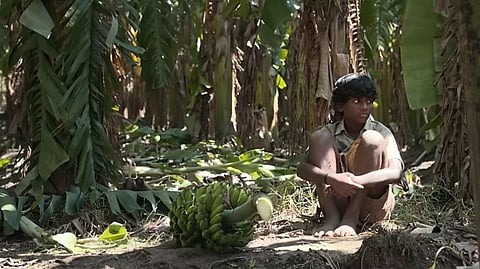Vaazhai review: Mari Selvaraj’s film on pain and power is deeply evocative
Vaazhai (Tamil)(4 / 5)
The cinema of Mari Selvaraj is often deeply elemental. The sun and fire symbolically envelop Dhanush as he navigates his way through bigotry in Karnan (2021). Characters embody the spirits of animals, changing the course of action in powerful turns in films such as Pariyerum Perumal (2018) and Maamannan (2023). But perhaps Mari’s most atmospheric film comes in Vaazhai, where the humble plantain fields bind, protect and callously control the labourers of the Puliyankulam village. Plantains are everywhere in Vaazhai. Its leaves creep in as the young Sivanainthan (a brilliant Ponvel) snakes in and out of his house. Its fruits adorn the heads of workers like a crown even as they relentlessly break backs in the muck. It overlooks romance, moments of jest between friends, and sometimes doom.
The declaration that the film is based on “true events” turns up more than once on screen, seconds before Vaazhai starts — the reiteration perhaps underlining the magnanimity of what the film stands for. Vaazhai is many things. It is a drama contouring the lives of workers fighting for dignity against exploitation and poverty. It is a retelling of an incident that “shattered the childhood” of Mari himself, and most of all, a beautiful story of a boy who navigates friendships, love, and a fate that he is raging to rewrite.
Sivanainthan is raised in a house of women and it shows. It shows in the way he expresses an infatuation (“You looked as beautiful as my mom then, you look as beautiful as my sister today,” he tells his teacher, conjuring all of the innocence in the world with a toothy smile), and it shows in the way he talks to people. His world might be tiny — it revolves around his mother (Janaki), his sister (Dhivya Duraisamy), and his confidant and ardent Kamal Haasan fan Sekhar, with whom he shares hilarious one-liners. His dreams too are tiny, but circumstances make even these desires look unattainable.
He might be the only boy in class to pass all subjects, but he is still very furtively put in his place by a casually casteist teacher who calls him “crooked neck” for all of the plantains he has to lug around. Vaazhai, in many ways, is yet another piece of a puzzle that Mari’s reformist cinema is trying to put together. The resistance here is the fight not just for better working conditions, but also dignity — this is registered when a mother yanks the gold off her ears when a fight breaks out, or when Sivanainthan pushes off a man who reprimands him for not just being a trespasser but for being a boy of his social rank stealing a paltry banana off his crop.
Theni Eshwar’s camera provides depth to Mari’s stirring writing treatment. We see it in the poignant shot of a hennaed hand that rises to deliver a statement, and in the way he films a swirling pot of boiling rice to signify yet another spiralling storm.
At its core, Vaazhai is a brilliant portrait of resilience. Sivanainthan is a born rebel. He hates lugging around the bananas that his family is forced to lug. So, he manages to find a way to get out of this rigamarole. He is constantly told by Sekhar not to crush on his favourite teacher (Nikhila Vimal), but still sweetly finds his way back to her, reminding us all of our nostalgic childhood. But will this spark finally help him find a way out of the fate that threatens his life?
If Karnan finally learns to use his voice at the end of Mari’s second film, Sivanainthan is a boy who perhaps develops this spark early on in his boyhood in Mari’s latest, incredible venture.
Disclaimer: This review was not paid for or commissioned by anyone associated with the film. Neither TNM nor any of its reviewers have any sort of business relationship with the film’s producers or any other members of its cast and crew.

